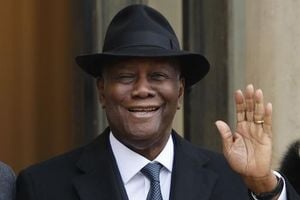Recent developments surrounding China's military expansion are raising serious concerns within the United States. Various officials have conveyed alarming assessments about the growing presence and capabilities of the Chinese armed forces.
Mike Rogers, who has served as the chairman of the House Intelligence Committee, addressed these concerns at the Anniston Civic Club. He emphasized the need for the U.S. to remain vigilant as China’s military power evolves at an unprecedented pace.
"The Chinese military growth is not just exponential; it’s alarming," Rogers stated during his address. He noted several areas, including advancements in cyber warfare and missile technology, which pose significant risks to U.S. interests globally.
China's military modernization efforts have escalated over the past decade, as they seek to project power beyond their borders. This has involved upgrading naval assets, enhancing air capabilities, and significantly investing in advanced technologies.
According to Rogers, the U.S. response needs to match the challenge posed by China. He remarked, "Our military and intelligence communities must adapt and innovate to counter these threats effectively."
Many experts believe the advancements made by China could significantly alter the balance of power in the Asia-Pacific region. This has prompted discussions on strengthening alliances with countries bordering China.
Rogers pointed out the importance of long-standing partnerships with nations such as Japan and South Korea. Maintaining these relationships is considered pivotal for ensuring regional stability.
Responding to these challenges, the Pentagon has committed to bolstering its military presence and readiness. Recent military exercises conducted with allied forces serve as both deterrent and preparation strategies.
Interestingly, the recent deployment of U.S. mid-range missile systems to the Philippines has caused alarm for China. Following discussions between Philippine Foreign Secretary Enrique Manalo and Chinese officials, it was highlighted how such deployments could exacerbate tensions.
Manalo reassured his Chinese counterpart of the temporary nature of the U.S. missile presence. China remains concerned, with officials expressing fears about potential destabilization of the region due to increased U.S. military activity.
The mid-range missile system, capable of firing weapons like the Tomahawk Land Attack Missile, was brought to the Philippines during joint military drills. Although no live-fire exercises were conducted with this deployment, the capability remains noteworthy.
China frequently opposes U.S. military deployments to the Asia-Pacific, warning it could endanger regional peace. The U.S. and its allies have countered by condemning China’s aggressive maneuvers, particularly its actions within the South China Sea.
Overlapping territorial claims between several nations, including Malaysia and Vietnam, only add complexity to the situation. Clarity on these issues is desperately sought as tensions rise.
Rogers's warnings echo broader concerns as defense experts evaluate the risks posed by China’s assertive military posture. The time to act, many agree, is now.
With the strategic environment shifting, the U.S. aims to adapt and strengthen its deterrence capabilities. Maritime patrols and joint exercises with allies are part of the strategy to counterbalance China’s ambitions.
Officials argue the need for investments not just in hardware but also strategies aimed at combating cyber threats, emphasizing the new terrain of warfare. Cybersecurity has rapidly become recognized as equally important as traditional military might.
The stakes are clear: the ability to respond to threats before they materialize could define future conflicts. Many believe faltering now could come at great cost later.
China, on its part, has reportedly been ramping up its own cyber capabilities to match its traditional military enhancements. This dual approach complicates the threat response matrix for the U.S.
Even with all the increasing tension, there are voices calling for dialogue. Some experts stress the importance of diplomatic channels to deescalate potential confrontations.
While Rogers advocates for preparedness, he also recognizes the role of communication. "Dialogue is necessary, but it must be backed up by strength," he remarked.
The future of U.S.-China relations remains uncertain, yet the current military dynamics are cause for concern. How these nations navigate this complex web will have lasting impacts on global politics.
Meanwhile, military officials advocate for reforms to modernize the U.S. armed forces. These changes are seen as necessary to counteract the rapidly advancing technology and capabilities of the Chinese military.
Investment in defense research and development is being highlighted as particularly urgent. Advancements must keep pace with China's initiatives.
Some analysts argue it’s not just conventional military power at stake but also technological supremacy. Emerging technologies such as artificial intelligence and robotics are reshaping modern warfare.
China's drive for advancements showcases its intentions to be regarded not just as a regional power but as a global leader. This ambition could significantly affect international alignments if left unchecked.
Rogers reiterated this point, stating, "We cannot underestimate China's goals. Their vision extends far beyond their borders, and that's something we need to recognize."
Experts posit it's more than just competition; it’s about comprehensively grasping how these various dimensions interconnect. The potential for instability could arise if diplomatic initiatives don’t match military readiness.
Both Rogers and military officials affirm the need for U.S. leadership on the world stage. They believe it’s their responsibility to rally partners and counteract the unified front China is presenting.
While there are numerous challenges ahead, experts urge the importance of utilizing existing alliances effectively. Coordinated efforts and shared intelligence can help mitigate uncertainties, allowing collaborative responses to emerge.
Summing up his concerns about China's military developments, Rogers stated, "America must lead decisively to protect its interests and uphold global order." This statement resonates as policymakers reflect on the current climate.
With both geopolitics and regional dynamics shifting, the U.S. faces pivotal decisions about its future strategy. The balance of power, human rights, and international law are all at stake as these nations strategically maneuver.
Rogers’ address highlights the urgency of addressing these issues. The window for action may be narrow, but the need for resolute leadership is clear.
The coming months will likely prove to be defining, as military experts and political leaders assess continually shifting terrains. The international community watches closely for signs of how the U.S. will respond to these challenges.
Clearly, the stakes are high as global power dynamics evolve and the need for effective strategies to counter threats is more pressing than ever before. The choices made today will not only impact America but resonate across the globe.



